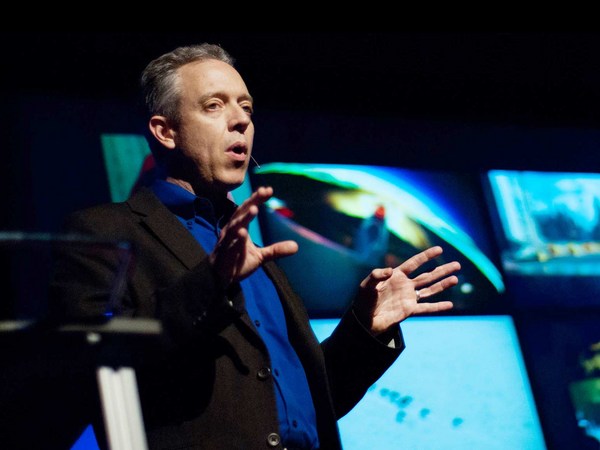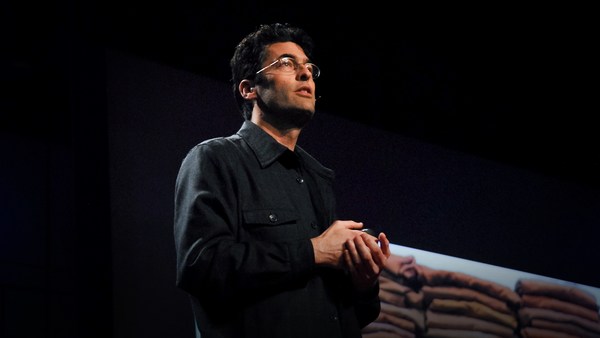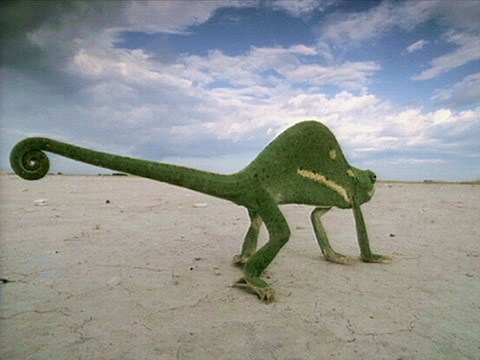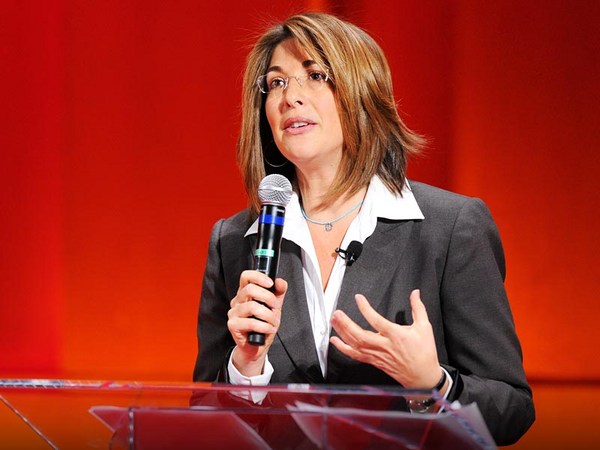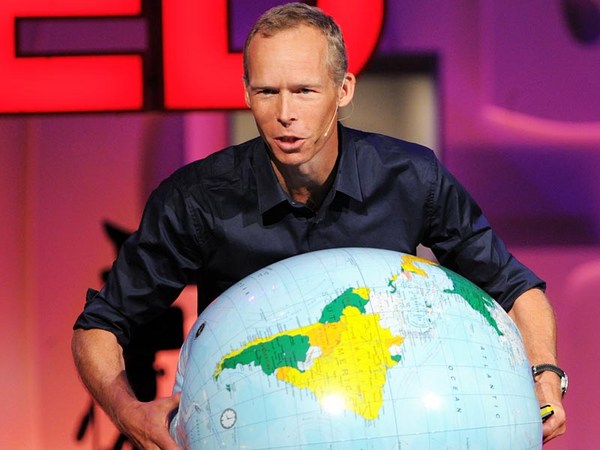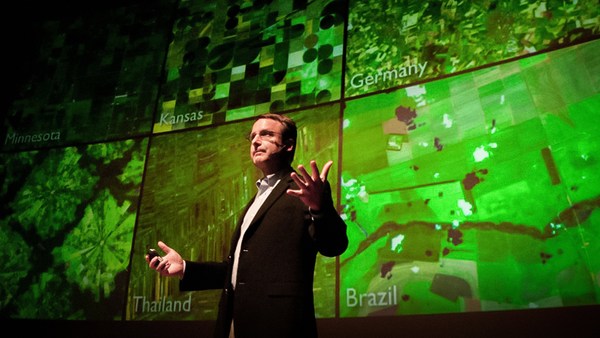I have a big impact on the planet to travel here by plane. I emitted, in the atmosphere, nine tons of CO2; that is the weight of two elephants. I came here to speak about ecology, and I emitted as much CO2 as a Frenchman in one year. So what do I have to do? I have to kill a Frenchman when I come back at home? (Laughter) I have to do my carbon offset in another way, like I do every time. (Laughter)
In fact my work is to show our impact on our planet. I'm going to show you some examples of the last pictures I've done in the last year.
Alberta sand oil, a lot of pollution. You know the problem; we don't want to believe what we know. In Alberta people work nonstop, 24 hours by seven to extract as much oil as they can. We know about the end of oil. Oil sand is not a long-term solution. But we use three times more oil than we find every year. We don't want to believe what we know. Deny.
Coral reef in New Caledonia. 100 percent of the coral may be wiped out before 2050 because of global warming. And you know how coral are very sensitive to temperature, and are very important for the biodiversity of the sea.
North Pole. I've done this picture last summer. It was impossible to do this picture 15 years ago. Now there is a new way open between Atlantic and Pacific. The thickness of the Arctic decreased more than 40 percent since 1960.
There is a new face of Kilimanjaro without ice. Sad picture. It lost 80 percent of its ice. According to scientists, in 100 years all the mountain glacier will be gone. Glaciers are very important for the life on earth. Like Al Gore told you, two billion people live on the water from the glacier of Himalaya.
Return of fish men. One fifth of human kind depend on fish to live. Today now 70 percent of the fish stock are over-exploited. According to FAO, if we don't change our system of fishing the main sea resources will be gone in 2050. We don't want to believe what we know.
The beautiful picture, by [unclear] in Africa. One human of six have not enough to eat in the world. One billion people have not enough to eat. In Africa, corn is one of the main foods in many places. Here in America, 90 percent of the corn cultivated is used to feed animals or to do oil.
Palm tree plantation in Borneo. Every year we lose 50 thousand square miles in deforestation.
Refugee camp in Darfur. Today we have 20 million refugees in the world. According to the U.N., we speak about 250 million refugees in 2050.
I always show my pictures in the street. We have done already 100 exhibitions in the cities. But how to understand the world without the voice of people? Landscape was not enough. It was obvious to me to do another work. I launched a project named Six Billion Others. I sent around the world six cameramen asking the same question, the same crucial question, about life. We have done five thousand interviews. I'm going to show you this.
Man: The most beautiful thing that has happened to me in life? It's when my dad told me, "Here, I give you this girl as your fiance."
Woman: Love? Love is nice if you can have it.
Second Man: Romeo and Juliet, Sassi and Panno, Dodi and Diana, Heer and Ranjha, this is love! Third Man: My greatest fear is ...
Woman: You're asking me a hard question.
Fourth Man: I live happily because what else should I do?
Fifth Man: The first thing I remember ... (Sixth Man: That's how I learned, by my mother,) Fifth Man: ... from my childhood, (Sixth Man: that you should respect humans.) Fifth Man: we were having fun, biking. (Sixth Man: I will never forget those words.)
Seventh Man: We invented stories, we flew around the world, while remaining in our attic.
Eighth Man: I had a big laugh today. Ninth Man: You see, family is ... it's awful.
10th Man: In the word life, you have the life.
11th Man: Who am I? Isn't that the biggest question?
12th Man: If I was to go back to Iraq and speak to the people, I'd have to bow down and kiss their feet. Just as that woman tried to kiss my feet when we were taking her sons. I feel ashamed. And I feel humbled by their strength. And I will forever feel a need to make reparations to Iraq.
Second Woman: Dad, Mom, I grew up. You shouldn't worry about me. Dad doesn't need to go to work. My family ... What can I say? At the moment, my family is very poor, my life here in Shenzhen is just about showing myself that I can earn more and to let my parents stay and have something to live on. I don't want them to spend their whole lives in poverty. If someday I can achieve something, I would like to say thank you daddy and mommy. Thank you. Thank you for having fed me and raised me, and for making my life of today. Thank you.
13th Man: After seven years now of being in a wheelchair, I've done more in life being in a chair than out of a chair. I still surf. I sail the world. I freedive. After many people said I couldn't do that. And I think that comes from connecting with nature, connecting with the energy of life, because we're all disabled in some way on the planet -- spiritually, mentally or physically. I got the easy part.
14th Man: Let's say that you and me like each other. You come from elsewhere. You don't know me. I don't know you. We talk without lying. If I do like you, I give you one cow and many other things and we become friends. How can we make it all by ourselves?
(Applause)
YAB: You can also go to the website, answer -- respond to the questions also. Forty crucial questions.
Now I am going to speak to you about my movie. For the last three years, I was shooting the earth for the movie. The name of the movie is "Home" -- "Maison." It is about the state of the planet. It's a fantastic story of life on the earth. I'm very proud to show you the teaser.
Video: This Earth is four and a half billion years old. These plants, several hundred million years old. And we humans have been walking upright for only 200 thousand years. We've managed to adapt, and have conquered the whole planet. For generations, we've been raising our children, not unlike millions of other species living beside us. For the past 30 years I've been closely watching the earth and its dwellers from high up in the sky. Our life is tied to the well-being of our planet. We depend on water, forests, deserts, oceans. Fishing, breeding, farming are still the world's foremost human occupations. And what binds us together is far greater than what divides us. We all share the same need for the earth's gifts -- the same wish to rise above ourselves, and become better. And yet we carry on raising walls to keep us apart.
Today our greatest battle is to protect the natural offerings of our planet. In less than 50 years we've altered it more thoroughly than in the entire history of mankind. Half of the world's forests have vanished. Water resources are running low. Intensive farming is depleting soils. Our energy sources are not sustainable. The climate is changing. We are endangering ourselves. We're only trying to improve our lives. But the wealth gaps are growing wider. We haven't yet understood that we're going at a much faster pace than the planet can sustain. We know that solutions are available today. We all have the power to change this trend for the better. So what are we waiting for? (Applause)
YAB: Luc Besson is the producer of the movie. But it is not a normal movie. The film is going to be distributed free. This film has no copyright. On the five of June, the environment day, everybody can download the movie on Internet. The film is given for free to the distributor for TV and theater to show it the fifth of June. There is no business on this movie. It is also available for school, cities, NGOs and you.
We have to believe what we know. Let me tell you something. It's too late to be pessimistic -- really too late. We have all a part of the solutions. To finish, I would like to welcome the 4,700th baby born since the beginning of this talk. Merci beaucoup. I love you. (Applause)
